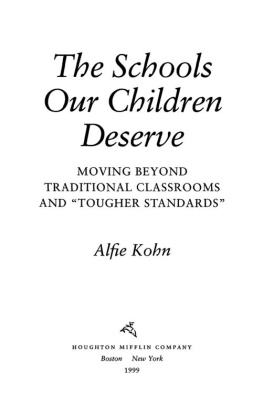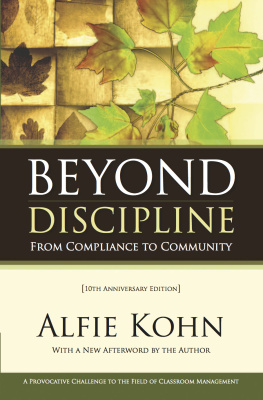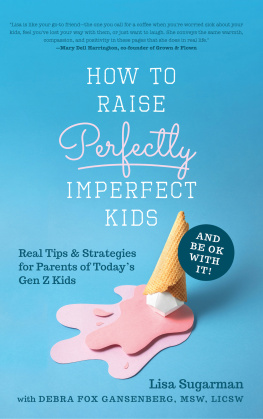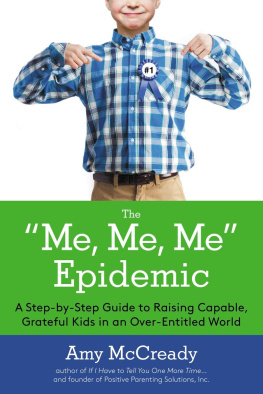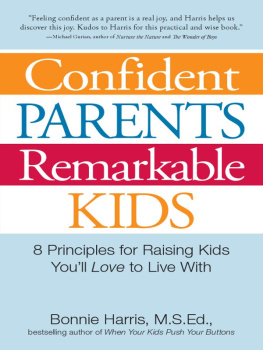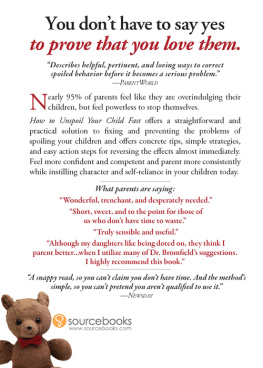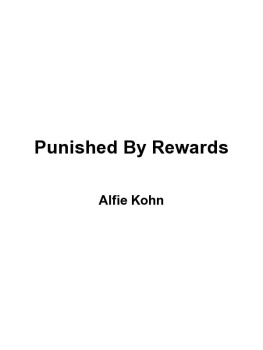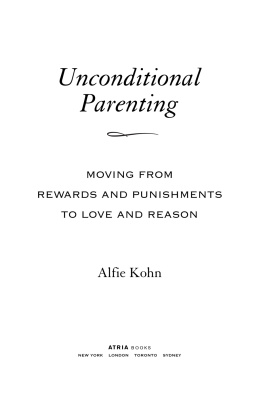THE MYTH OF THE SPOILED CHILD
ALSO BY ALFIE KOHN

Feel-Bad Education: And Other Contrarian Essays on
Children and Parenting (2011)
The Homework Myth: Why Our Kids Get Too Much of a Bad Thing (2006)
Unconditional Parenting: Moving from Rewards and Punishments to Love and Reason (2005)
What Does It Mean to Be Well Educated?: And More Essays on Standards, Grading, and Other Follies (2004)
The Case Against Standardized Testing: Raising the Scores, Ruining the Schools (2000)
The Schools Our Children Deserve: Moving Beyond Traditional Classrooms and Tougher Standards (1999)
What to Look for in a Classroom... And Other Essays (1998)
Beyond Discipline: From Compliance to Community (1996)
Punished by Rewards: The Trouble with Gold Stars, Incentive Plans, As, Praise, and Other Bribes (1993)
You Know What They Say...: The Truth About Popular Beliefs (1990)
The Brighter Side of Human Nature: Altruism and Empathy in Everyday Life (1990)
No Contest: The Case Against Competition (1986)


Copyright 2014 by Alfie Kohn.
All rights reserved. No part of this publication may be reproduced, stored in a retrieval system, or transmitted, in any form or by any means, electronic, mechanical, photocopying, recording, or otherwise, without the prior written permission of the publisher. For information, address Da Capo Press, 44 Farnsworth Street, 3rd Floor, Boston, MA 02210.
Editorial production by the Book Factory.
Cataloging-in-Publication data for this book is
available from the Library of Congress.
ISBN: 978-0-7382-1725-3 (e-book)
Published by Da Capo Press
A Member of the Perseus Books Group
www.dacapopress.com
Da Capo Press books are available at special discounts for bulk purchases in the U.S. by corporations, institutions, and other organizations. For more information, please contact the Special Markets Department at the Perseus Books Group, 2300 Chestnut Street, Suite 200, Philadelphia, PA 19103, or call (800) 810-4145, ext. 5000, or e-mail .
10 9 8 7 6 5 4 3 2 1
To M.W., whose marginalia always elevates what I started with.
Contents
W hile chatting with a friend in his garden one day, the linguist George Lakoff came up with an interesting thought experiment. Was there, Lakoff wondered, a single question that one could ask people such that their answer would predict whether they were liberal or conservative on a range of political issues? Yes, his friend replied. Just ask them this: If your baby cries at night, do you pick him up?
Lakoff tells this story at the beginning of his book Moral Politics to explain how he came to believe that our views on any number of topicsabortion, capital punishment, gun control, environmental regulation, foreign policy, immigration, and moreoften bespeak a deeper moral vision. And this vision, he maintains, can be described in terms of models of the family. Conservative positions reflect what he calls a Strict Father model, while liberal positions point to a Nurturant Parent model.
Even after making my way through his 425-page book, Im not entirely clear what status Lakoff meant to attribute to these views of parenting. Are they metaphors? (Elsewhere, hes written about how our thoughts and actions are shaped by metaphors we may not even be aware of using.) Or are ones attitudes about raising children actually supposed to be correlated
Whatever their status, the models themselves are coherent and undeniably compellingIll say more about the Strict Father approach laterand its fascinating to imagine that the way you treat your kids really can predict and explain your politics. Does a heavy-handed emphasis on obedience in the home foretell opposition to affirmative action? Are parents who talk things over with their children rather than spanking them more likely to favor tax incentives to promote renewable energy? The possibilities lend new meaning to Wordsworths adage, The child is father of the man.
Theres just one problem with Lakoffs theory. An awful lot of people who are politically liberal begin to sound like right-wing talk-show hosts as soon as the conversation turns to children and parenting. It was this curious discrepancy, in fact, that inspired the book you are now reading.
I first noticed an inconsistency of this kind in the context of education. Have a look at the unsigned editorials in left-of-center newspapers, or essays by columnists whose politics are mostly progressive. Listen to speeches by liberal public officials. On any of the controversial issues of our day, from tax policy to civil rights, youll find approximately what youd expect. But when it comes to education, almost all of them take a hard-line position very much like what we hear from conservatives. They endorse a top-down, corporate-style version of school reform that includes prescriptive, one-size-fits-all teaching standards and curriculum mandates; weakened job protection for teachers; frequent standardized testing; and a reliance on rewards and punishments to raise scores on those tests and compel compliance on the part of teachers and students.
Admittedly there is some disagreement about the proper role of the federal government in all of thisand also about the extent to which public schooling should be privatized
Applause for this agenda has come not only from corporate America but also from both sides of the aisle in Congress and every major media outlet in the United States. Indeed, the generic phrase school reform has come to be equated with these specific get-tough policies. To object to them is to risk being labeled a defender of the status quo, even though they have defined the status quo for some time now. Many of the people who have objected are teachers and other education experts who see firsthand just how damaging this approach has been, particularly to low-income students and the schools that serve them. But a key element of reform is to define educators as part of the problem, so their viewpoint has mostly been dismissed.
Whats true of attitudes about education is also largely true of the way we think about children in generalwhat theyre like and how they should be raised. Of course politicians are far less likely to speak (or newspapers to editorialize) about parenting. But columnists do weigh in from time to time and, when they do, those who are generally liberal once again do a remarkable imitation of conservatives. Articles about parenting in general-interest periodicals, meanwhile, reflect the same trend. The range of viewpoints on other topics gives way to a stunningly consistent perspective where children are concerned.
That perspective sounds something like this:
We live in an age of indulgence in which permissive parents refuse to set limits for, or say no to, their children.
Parents overprotect their kids rather than let them suffer the natural consequences of their own mistakes. Children would benefit from experiencing failure, but their parents are afraid to let that happen.
Adults are so focused on making kids feel special that were raising a generation of entitled narcissists. They get trophies even when their team didnt win; theyre praised even when they didnt do anything impressive; and they receive As for whatever they turn in at school. Alas, theyll be in for a rude awakening once they get out into the unforgiving real world.
Next page

